Increased police presence at polling places across the South led to isolated incidents of harassment and intimidation, primarily directed toward Black voters. But in a seemingly "unprecedented" paradox, local officers were often stationed at election sites to help prevent "self-deputized" white supremacists groups or armed supporters of former President Donald Trump from "monitoring" voters.
The Southern Poverty Law Center (SPLC) last week released a 2020 election report, which detailed cases of voter intimidation, suppression and pandemic problems across several states with a history of "racial gerrymandering." The report, Overcoming the Unprecedented: Southern Voters' Battle Against Voter Suppression, Intimidation, and a Virus, looked at the complex challenges that emerged as a result of there being a high-profile election combined with tense racial and pandemic health issues.
The report noted that voting rights advocates "typically discourage the presence of law enforcement officers" at polls, due to intimidation concerns. It also highlighted numerous anecdotes in which Black or minority voters felt intimidated by the presence of "loitering" local officers, or gun-toting amateur "election monitors."
In Autauga County, Alabama, a responding deputy turned out to be a bigger problem than the disturbance for which he was called, even leveling interrogation-type questions toward Black voters. The "hostile" deputy was "clearly not familiar with basic electioneering laws," the report stated.
In Pike County, Alabama, a "Blue Lives Matter" sign was prominently posted inside a polling location. And in Miami, Florida, a uniformed officer voted while wearing a face mask with a pro-Trump slogan.
But while there were only a "few isolated incidents" that turned violent, officials in Alabama, Georgia, Florida, Louisiana and Mississippi were generally more prepared to protect voters from extremist groups who threatened to disrupt the election process. The report highlighted that there are 1,600 extremist groups in the U.S. today, many of whom threatened to "deputize themselves" in order to ensure a "fair election," as Trump had urged his supporters to do for months.
"A lone but armed Trump supporter loitered outside a polling place in Louisiana," the report noted.
The SPLC cited the white supremacist Oath Keepers and Three Percenters as militia groups that initially prompted law enforcement to be at the polls for protection in the first place—just one of many unique challenges faced by voting rights activists and Southern voters themselves last November.
"The pandemic brought massive, unforeseen stresses to the electoral system and compounded threats that already existed. Disinformation about absentee voting and voter fraud spread rapidly on social media. Voter intimidation threats increased as white supremacist groups were emboldened by President Donald Trump's open support and encouragement," the report's executive summary summarized.
The report detailed how many of the Deep South's problems had been around for decades upon decades, long before coronavirus. The authors noted the region's "deeply entrenched systemic racism, high rates of poverty, economic and social inequality, and being ground zero for voter suppression since the passage of the Fifteenth Amendment," the anti-racial discrimination law ratified in 1870.
The SPLC also criticized additional Southern states for taking advantage of new tactics that could suppress voting—such as Texas implementing a photo ID law and North Carolina passing a voter law that a federal court later ruled aimed at Black voters with "almost surgical precision," according to the report.
The study described how voting protection that had been built up for years faced numerous challenges due to the pandemic, particularly as "in-person canvassing was no longer safe."
Newsweek reached out to Southern Poverty Law Center Sunday afternoon for additional remarks.

Uncommon Knowledge
Newsweek is committed to challenging conventional wisdom and finding connections in the search for common ground.
Newsweek is committed to challenging conventional wisdom and finding connections in the search for common ground.
About the writer
Benjamin Fearnow is a reporter based out of Newsweek's New York City offices. He was previously at CBS and Mediaite ... Read more
To read how Newsweek uses AI as a newsroom tool, Click here.








